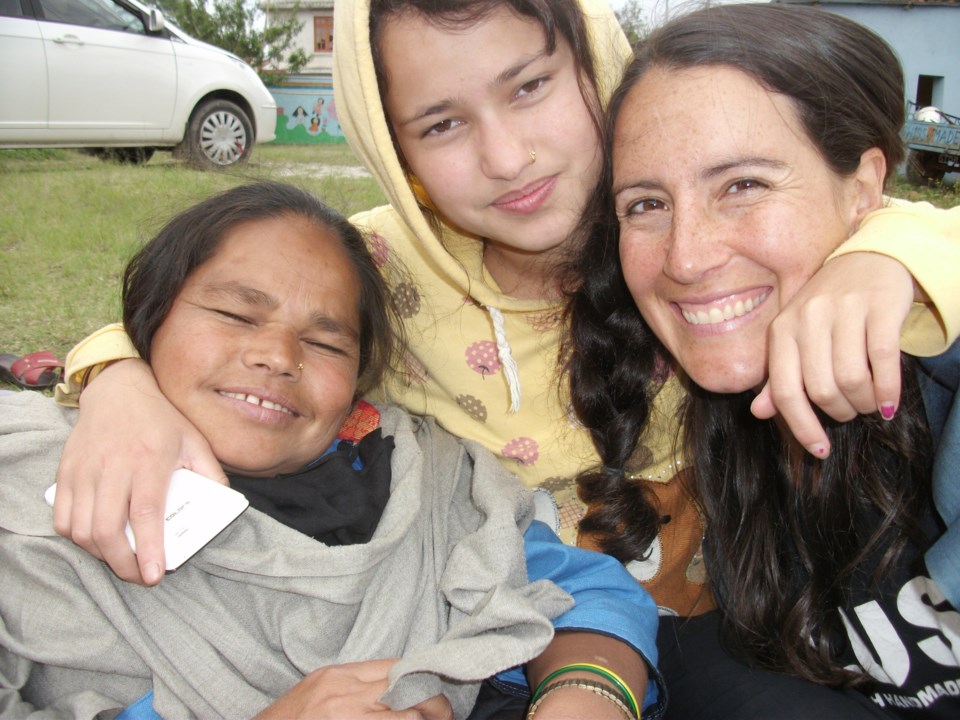Pearl Gottschalk was teaching 30 kids between the ages of 3 and 16 to do the hokey-pokey when the earth started to shake.
“Someone yelled, earthquake! But it was in Nepalese so I didn’t understand, but then I could feel the building start to sway,” says Gottschalk. “Most of the kids could escape the building quickly but those of us who couldn’t get out, just knelt down in the middle of the room and us two remaining adults tried to cover the kids with our bodies, and we just prayed.”
This was just the beginning of Gottschalk’s harrowing experience on what was supposed to be the last day of her trip to Nepal. The Bowen Islander of two years works as a Charitable Giving Ambassador for LUSH Cosmetics, and was in Nepal to volunteer with one of the company’s partner charities building earthquake proof schools and scouting out a new charity, called the Women’s Foundation of Nepal, just outside of Kathmandu.
This is where she was when the earthquake hit. The Foundation is a shelter for women and children escaping violent and dangerous situations. While Gottschalk spent time with the children, the mothers were away doing skills training. Gottschalk, the other adults she was with and the children escaped the building as soon as the first rumbling of the earth stopped, and then waited the next five hours huddled together for warmth through continuing terrifying aftershocks that rocked the earth they sat on.
“We had no idea when the aftershocks would end, there was no working radio, no information coming in,” says Gottschalk. “None of the kids knew whether their mothers were alive or dead, and then when the radio did come on the news was horrible, 800 people dead here, others dead there…”
Gottshalk’s Nepalese host insisted on getting her back into Kathmandu.
“When we got to a point where the roads were blocked making it impossible to drive, I said I would make my way on foot into the city. She wanted to come with me, and was primarily concerned about my safety, but I insisted she go and find her family,” says Gottschalk.
Gottschalk says that as she walked into the backpacker’s district of Kathmandu, people flooded into any open space available.
“Without running water and electricity, virtually all the hotels shut down and sent their staff home. There is a palace area that is normally inaccessible because it used to be surrounded by walls, but the walls had all crumbled and many people congregated there. People told me to stay in an open space, but I was determined to find the friend I had traveled to Nepal with, so I kept making my way towards our hotel. I found that it was one of the few that welcomed us back inside, and the staff helped me feel safe as it was built to withstand a 10.0 earthquake.”
Gottschalk says that after a two hour wait, her friend returned. Even though they were supposed to catch a flight home that night, the airport was closed and the radio warned of impending aftershocks through the night.
“We had an evacuation plan, and we contemplated executing it almost every forty minutes when another aftershock would hit and the hotel
would shake and we would jump out of bed,” says Gottschalk.
In the morning, after 22 hours without contacting their families, the women stumbled upon a small travel agency with lights and working internet.
“We credit Raj from World Favour Travel for saving us with the internet,” says Gottschalk. “As soon as we sent messages to our friends and family telling them we were ok, Raj said he was shutting the shop to go and help. I wanted to go with him, but our Nepalese friends said they were coming to the hotel to get help us get to the airport.”
Aftershocks continued along the journey to the airport. A major tremor hit forceing the women to evacuate the car with hundreds of others in the street as a nearby building teetered above them.
“And at the airline, they declined us a seat on the plane three times because we had missed our flight the night before, but we just kept trying to be polite and thankful. After an 11 hour wait they let us on a plane,” say Gottschalk.
One week after arriving home, Gottschalk says that she is blown away by all the people who conspired to bring her to safety, as well as all the people here who are reaching out to help people they don’t even know, a world away in Nepal.
“The hardest part is leaving but I knew I could continue to help from home” she says. “It felt so great to see the people fundraising outside the Snug last weekend. And I’ve connected with Kate Coffey, who is fundraising for the Spinal Rehab Clinic in Kathmandu, and Courtney Morris, who will be giving acupuncture treatments to raise money for Doctors Without Borders.”
She adds that returning to work was like returning to a supportive family, and it feels particularly good to have a job that is all about giving back.
“My job is to continue to support the charities I was working with in Nepal and LUSH has made a major donation to the relief efforts with a focus on women’s needs, pregnant mothers and birthing centers in honor of all the mothers who have lost loved ones in this tragedy.”
Gottschalk suggests donating to local Nepali NGO’s such as the Women’s Foundation of Nepal (www.womennepal.org) or who will use every penny to support those most affected as they work tirelessly through this disaster. You can read more about their current relief efforts on their blog at http://www.womenepal.org/blog/



